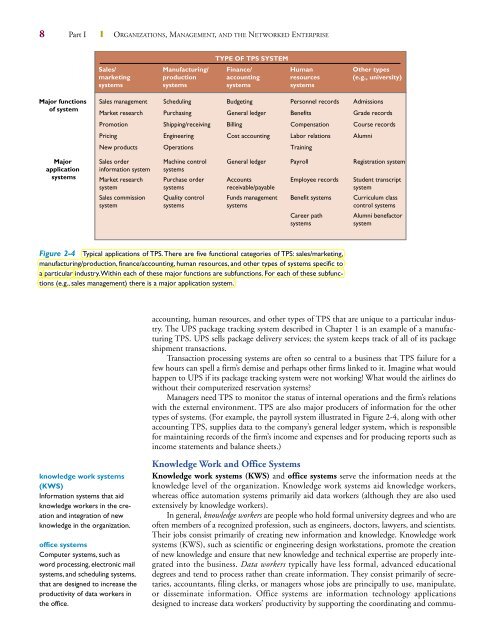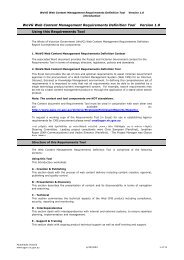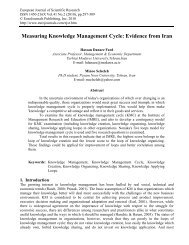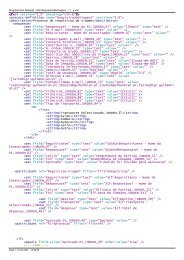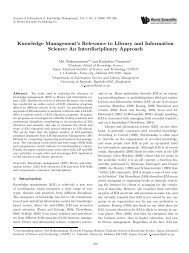2 Information Systems in the Enterprise - Main Web
2 Information Systems in the Enterprise - Main Web
2 Information Systems in the Enterprise - Main Web
Create successful ePaper yourself
Turn your PDF publications into a flip-book with our unique Google optimized e-Paper software.
8 Part I ❙ ORGANIZATIONS, MANAGEMENT, AND THE NETWORKED ENTERPRISE<br />
Major functions<br />
of system<br />
Major<br />
application<br />
systems<br />
Sales/<br />
market<strong>in</strong>g<br />
systems<br />
Manufactur<strong>in</strong>g/<br />
production<br />
systems<br />
Sales management Schedul<strong>in</strong>g<br />
Market research Purchas<strong>in</strong>g<br />
Promotion Shipp<strong>in</strong>g/receiv<strong>in</strong>g<br />
Pric<strong>in</strong>g Eng<strong>in</strong>eer<strong>in</strong>g<br />
New products Operations<br />
Sales order<br />
<strong>in</strong>formation system<br />
Market research<br />
system<br />
Sales commission<br />
system<br />
TYPE OF TPS SYSTEM<br />
F<strong>in</strong>ance/<br />
account<strong>in</strong>g<br />
systems<br />
Human<br />
resources<br />
systems<br />
Figure 2-4 Typical applications of TPS. There are five functional categories of TPS: sales/market<strong>in</strong>g,<br />
manufactur<strong>in</strong>g/production, f<strong>in</strong>ance/account<strong>in</strong>g, human resources, and o<strong>the</strong>r types of systems specific to<br />
a particular <strong>in</strong>dustry.With<strong>in</strong> each of <strong>the</strong>se major functions are subfunctions. For each of <strong>the</strong>se subfunctions<br />
(e.g., sales management) <strong>the</strong>re is a major application system.<br />
knowledge work systems<br />
(KWS)<br />
<strong>Information</strong> systems that aid<br />
knowledge workers <strong>in</strong> <strong>the</strong> creation<br />
and <strong>in</strong>tegration of new<br />
knowledge <strong>in</strong> <strong>the</strong> organization.<br />
office systems<br />
Computer systems, such as<br />
word process<strong>in</strong>g, electronic mail<br />
systems, and schedul<strong>in</strong>g systems,<br />
that are designed to <strong>in</strong>crease <strong>the</strong><br />
productivity of data workers <strong>in</strong><br />
<strong>the</strong> office.<br />
Mach<strong>in</strong>e control<br />
systems<br />
Purchase order<br />
systems<br />
Quality control<br />
systems<br />
O<strong>the</strong>r types<br />
(e.g., university)<br />
Budget<strong>in</strong>g Personnel records Admissions<br />
General ledger Benefits Grade records<br />
Bill<strong>in</strong>g Compensation Course records<br />
Cost account<strong>in</strong>g Labor relations<br />
Tra<strong>in</strong><strong>in</strong>g<br />
Alumni<br />
General ledger Payroll Registration system<br />
Accounts<br />
receivable/payable<br />
Funds management<br />
systems<br />
Employee records Student transcript<br />
system<br />
Benefit systems Curriculum class<br />
control systems<br />
Career path<br />
systems<br />
Alumni benefactor<br />
system<br />
account<strong>in</strong>g, human resources, and o<strong>the</strong>r types of TPS that are unique to a particular <strong>in</strong>dustry.<br />
The UPS package track<strong>in</strong>g system described <strong>in</strong> Chapter 1 is an example of a manufactur<strong>in</strong>g<br />
TPS. UPS sells package delivery services; <strong>the</strong> system keeps track of all of its package<br />
shipment transactions.<br />
Transaction process<strong>in</strong>g systems are often so central to a bus<strong>in</strong>ess that TPS failure for a<br />
few hours can spell a firm’s demise and perhaps o<strong>the</strong>r firms l<strong>in</strong>ked to it. Imag<strong>in</strong>e what would<br />
happen to UPS if its package track<strong>in</strong>g system were not work<strong>in</strong>g! What would <strong>the</strong> airl<strong>in</strong>es do<br />
without <strong>the</strong>ir computerized reservation systems?<br />
Managers need TPS to monitor <strong>the</strong> status of <strong>in</strong>ternal operations and <strong>the</strong> firm’s relations<br />
with <strong>the</strong> external environment. TPS are also major producers of <strong>in</strong>formation for <strong>the</strong> o<strong>the</strong>r<br />
types of systems. (For example, <strong>the</strong> payroll system illustrated <strong>in</strong> Figure 2-4, along with o<strong>the</strong>r<br />
account<strong>in</strong>g TPS, supplies data to <strong>the</strong> company’s general ledger system, which is responsible<br />
for ma<strong>in</strong>ta<strong>in</strong><strong>in</strong>g records of <strong>the</strong> firm’s <strong>in</strong>come and expenses and for produc<strong>in</strong>g reports such as<br />
<strong>in</strong>come statements and balance sheets.)<br />
Knowledge Work and Office <strong>Systems</strong><br />
Knowledge work systems (KWS) and office systems serve <strong>the</strong> <strong>in</strong>formation needs at <strong>the</strong><br />
knowledge level of <strong>the</strong> organization. Knowledge work systems aid knowledge workers,<br />
whereas office automation systems primarily aid data workers (although <strong>the</strong>y are also used<br />
extensively by knowledge workers).<br />
In general, knowledge workers are people who hold formal university degrees and who are<br />
often members of a recognized profession, such as eng<strong>in</strong>eers, doctors, lawyers, and scientists.<br />
Their jobs consist primarily of creat<strong>in</strong>g new <strong>in</strong>formation and knowledge. Knowledge work<br />
systems (KWS), such as scientific or eng<strong>in</strong>eer<strong>in</strong>g design workstations, promote <strong>the</strong> creation<br />
of new knowledge and ensure that new knowledge and technical expertise are properly <strong>in</strong>tegrated<br />
<strong>in</strong>to <strong>the</strong> bus<strong>in</strong>ess. Data workers typically have less formal, advanced educational<br />
degrees and tend to process ra<strong>the</strong>r than create <strong>in</strong>formation. They consist primarily of secretaries,<br />
accountants, fil<strong>in</strong>g clerks, or managers whose jobs are pr<strong>in</strong>cipally to use, manipulate,<br />
or dissem<strong>in</strong>ate <strong>in</strong>formation. Office systems are <strong>in</strong>formation technology applications<br />
designed to <strong>in</strong>crease data workers’ productivity by support<strong>in</strong>g <strong>the</strong> coord<strong>in</strong>at<strong>in</strong>g and commu-


